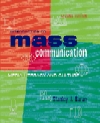Stanley J. Baran
| binary code | information transformed into a series of digits 1 and 0 for storage and manipulation in computers
|
 |
 |
 |
| browsers | software programs loaded on personal computers and used to download and view Web files
|
 |
 |
 |
| click stream | the series of choices made by a user on the Web
|
 |
 |
 |
| dataveillance | the massive electronic collection and distillation of consumer data
|
 |
 |
 |
| digital computer | a computer that processes data reduced to a binary code
|
 |
 |
 |
| domain name | on the World Wide Web, an identifying name, rather than a site's formal URL, that gives some indication of the nature of a site's content or owner
|
 |
 |
 |
| e-mail (electronic mail) | function of Internet allowing communication via computer with anyone else online, anyplace in the world, with no long-distance fees
|
 |
 |
 |
| embedded systems | systems that combine Internet capabilities with other technologies to add intelligence to those technologies
|
 |
 |
 |
| encryption | coding online content at the source so that it can only be read by an end user with appropriate decoding software; used for security purposes
|
 |
 |
 |
| fair use | in copyright law, instances where material may be used without permission or payment
|
 |
 |
 |
| First Amendment | Congress shall make no law respecting an establishment of religion, or prohibiting the free exercise thereof; or abridging the freedom of speech, or of the press; or the right of the people peacefully to assemble, and to petition the Government for a redress of grievances
|
 |
 |
 |
| flat rate billing | a flat monthly charge levied by a provider for Internet access
|
 |
 |
 |
| global village | a McLuhan concept; new communication technologies permit people to become increasingly involved in one another's lives
|
 |
 |
 |
| gripe site | Web page designed to counter or challenge another person or institution, typically one having more power than the site's creator
|
 |
 |
 |
| hackers | people interested in technology, information, and communication through computers
|
 |
 |
 |
| home page | entry way into a Web site, containing information and hyperlinks to other material
|
 |
 |
 |
| hosts | computers linking individual personal computer users to the Internet
|
 |
 |
 |
| hyperlink | connection, imbedded in Internet or Web site, allowing instant access to other material in that site as well as to material in other sites
|
 |
 |
 |
| information gap | the widening disparity in amounts and types of information available to information haves and have-nots
|
 |
 |
 |
| Internet | a global network of interconnected computers that communicate freely and share and exchange information
|
 |
 |
 |
| LANs (Local Area Networks) | networks connecting two or more computers, usually within the same building
|
 |
 |
 |
| mainframe computer | a large central computer to which users are connected by terminals
|
 |
 |
 |
| micro computer | a very small computer that uses a microprocessor to handle information (also called a personal computer or PC)
|
 |
 |
 |
| mini-computers | a relatively large central computer to which users are connected by terminals; not as large as a mainframe computer
|
 |
 |
 |
| modem | a device that translates digital computer information into an analog form so it can be transmitted through telephone lines
|
 |
 |
 |
| MP3 | file compression software that permits streaming of digital audio and video data
|
 |
 |
 |
| multimedia | advanced sound and image capabilities for micro computers
|
 |
 |
 |
| multiple user domain (MUD) | an online, virtual "community" where users are encouraged to create their own identities, which then interact with other virtual citizens of that community
|
 |
 |
 |
| open source software | freely downloaded software
|
 |
 |
 |
| operating system | the software that tells the computer how to work
|
 |
 |
 |
| pay-as-you-go pricing | billing Internet users based on the amount of time spent online
|
 |
 |
 |
| personal computer (PC) | see micro computer
|
 |
 |
 |
| piracy | the illegal recording and sale of copyrighted material
|
 |
 |
 |
| protocols | common rules that allow any computers to communicate with each other
|
 |
 |
 |
| providers (Internet) | companies that offer Internet connections at monthly rates depending on the kind and amount of access needed; also called internet service providers (ISPs)
|
 |
 |
 |
| search engines (sometimes called spiders, or Web crawlers) | Web or Net-search software providing on-screen menus
|
 |
 |
 |
| spiders | see search engines
|
 |
 |
 |
| technology gap | the widening disparity between communication technology haves and have-nots
|
 |
 |
 |
| URL (Uniform Resource Locator) | the designation of each file or directory on the host computer connected to the Internet
|
 |
 |
 |
| USENET | also known as network news, an internationally distributed Internet bulletin board system
|
 |
 |
 |
| WANs (Wide Area Networks) | networks that connect several LANs in different locations
|
 |
 |
 |
| Web crawlers | see search engines
|
 |
 |
 |
| World Wide Web | a tool that serves as a means of accessing files on computers connected via the Internet
|
 |
 |
 |
| zone | Internet address information, typically either geographic or descriptive of the type of organization
|



 2002 McGraw-Hill Higher Education
2002 McGraw-Hill Higher Education

 2002 McGraw-Hill Higher Education
2002 McGraw-Hill Higher Education